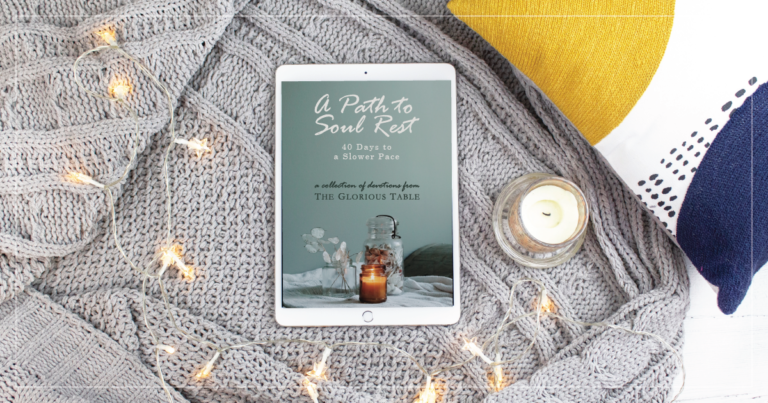Every autumn, as the school year begins and we are all settling into new routines and thinking about the ten months ahead, my choice to homeschool naturally comes up in conversation. People ask me how I manage to both work full time and homeschool, and I love sharing how it all works for us. I believe anyone who wants to can homeschool, even a mom who works. Yes, it helps to have a job you can do from home, but I know people in all kinds of professions who work and homeschool their kids–it just takes initiative and creativity and a willingness to put forth the effort. But what I want to talk about today is the question that usually follows: If it takes so much effort, why do I homeschool? Why go to all that trouble when I could send my kids to public school? Why add something of this magnitude to my already full plate?
An Education with a Christian Worldview
I want my daughters to grow up with an education based on a Christian worldview. Homeschooling allows us the freedom and opportunity to make Bible reading, Scripture memorization (see Ps. 119:9-11), prayer, and even worship to our days. Granted, we could probably do this at home regardless, but because we begin our school day with these spiritual practices, our faith is the cornerstone on which the rest of the day is built. We study church history and heroes of the faith as part of our curriculum, which is something that wouldn’t happen in public school. And since we approach everything from a Christian worldview, that means we study everything from history to science to literature and the arts with our Creator as the focus. When you approach academics with this in mind, it’s a wonder fest every day.
Truth, Goodness, and Beauty
I want to ensure that each day of my daughters’ education is infused with truth, goodness, and beauty. We will study hard things, sure, like the Holocaust (we read Claire Hutchet Bishop’s Twenty and Ten this year, for example), but I get to pick and choose the texts we use to do that. For that matter, I get to choose all of our literature, and I can make good books a priority, choosing living books over traditional textbooks, even for subjects like science and history. I was a voracious reader as a kid, and I firmly believe that the literature we read infuses our very souls. I know reading good books–books of truth, goodness, and beauty–helped me become an adult who sees those things in the world around her. I want the same for my kids.
The Ability to Choose What, When, and How
I don’t want to shelter my girls, but I do want the freedom to choose what, when, and how they learn, especially when it comes to things like body development and sex. I will never forget how my own innocence was compromised by the girl who brought a copy of Forever by Judy Blume to school in sixth grade. We huddled around her on the playground while she read portions aloud. We all giggled, but a feeling of shame lingered–I certainly couldn’t tell my mom about that! And it opened the door to my ability to seek out other literature it would have been better for me not to read at that age. I can’t control what other people allow their children to be exposed to at early ages, but I can try to secure a greater chance that my girls will learn the facts of life from me, at home, when I deem they are ready.
The Opportunity to “Spread a Feast”
Public schools today have seen a reduction of “elective” studies like art, music, and so on. This is especially true at the upper levels. As well, our schools tend to be under-resourced in the area of foreign language at the elementary level. And research shows that language fluency comes easier when language study is begun early. By homeschooling, I ensure my girls are able to engage such subjects as art history, music history, multiple foreign languages, Shakespeare (Yes! Even in first grade!), and handicrafts. We are also learning cursive, which has been cut from the curriculum at many schools even though the research says it should be otherwise.
Ample Time to Play
With each generation, children have had less time for free play. And research shows that play time is critical for child development. My oldest daughter, who is in “first grade” this year (notice my quotation marks there–I’ll get to the reason for that in the next section) spends an hour in the morning and an hour in the afternoon with her schoolbooks. We do hands-on things like art and nature walks on the weekend. The rest of her weekdays allow her freedom to play, and that time is pretty much screen-free. She has time to dream and imagine, to make up stories, write poems and songs, paint, construct puzzles, playact, and so much more. And none of it is scheduled–she is free to follow her own whims. As well, this means that “afterschool” activities like piano and dance are a chance to get out of the house and interact with others for a short time, instead of being “one more thing” at the end of a full day in a public school.
The Understood Betsy Principle
In chapter 5 of Understood Betsy by Dorothy Canfield Fisher, the main character, a nine-year-old girl newly arrived in the Vermont countryside, finds herself in a one-room schoolhouse much different from the city behemoth to which she has been accustomed. During the course of the day, the teacher assesses Betsy’s ability in the “3 Rs,” and places her into appropriate classes for her ability level. After all this sorting out has been accomplished, Betsy approaches the teacher and says,
“If I’m second-grade arithmetic and seventh-grade reading and third-grade spelling, what grade am I?”
To which the teacher replies,
“You aren’t any grade at all, no matter where you are in school. You’re just yourself, aren’t you? What difference does it make what grade you’re in? And what’s the use of your reading little baby things too easy for you just because you don’t know your multiplication table?”
This is the crux for me: the ability to work for mastery, however long that takes, rather than the goal being to stay with the pack. While public schools claim that they are committed to meeting the individual needs of every student, it just isn’t fully possible with an average child-to-teacher ratio of 28:1 or greater (and this is nothing against teachers, mind you–teachers are heroes because they pretty much kill themselves trying to do this exact thing; I was a public school teacher for ten years myself). And let’s also be honest in just saying that operating outside of expected grade level in public school carries stigmas with it, which can have a negative effect on the mind and emotions of any child. I could write 537,322 posts on this subject alone.
But let’s look at what Fisher’s narrator goes on to say about Betsy’s mental response to this assertion that what grade she was in was a moot point:
“Never before had she known what she was doing in school. She had always thought she was there to pass from one grade to another, and she was ever so startled to get a little glimpse of the fact that she was there to read and write and cipher and generally use her mind, so she could take care of herself when she came to be grown up.”
Because homeschooling offers the opportunity for truly individualized instruction, we can let our children lead the way. My “first grader” is doing “second-grade” math, and reads somewhere above an “eighth-grade” level–I haven’t had her tested because I would only be doing so to appease my curiosity, not because we need to know–and prints like a kindergartener (she’s doing much better with cursive, by the way–see the link above on that topic). That’s the beauty of homeschooling. We just honor where she’s at and work for growth and mastery, no matter the timing.
Scheduling Freedom
The freedom to go on vacation in late October if we want to isn’t really a reason for choosing homeschooling, but it is a definite bonus. Our scheduling freedom lies more in the ability to do school four days a week if my husband has a day off, to take a longer break over the holidays, and to take more frequent breaks during the year. We have to log 180 days of school to meet our state’s requirements, but we can log those 180 days any way we want to. If we spend a Saturday doing art and nature study, that counts. If we want to school through the summer so we can take every seventh week off during the traditional school year, we can do that. And yes, traveling cheap in the off-season as a family is nice.
Pure Joy
Finally, I homeschool because I love it. I taught English at three different public high schools from 1998 through 2008, and it never gave me as much joy as walking this road with my own children, stewarding their education, seeing them grow and pass milestones, developing a deep appreciation for how God made them, unique and precious. It’s a major source of joy in my life, and I wouldn’t have it any other way.


